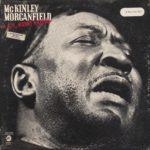Remembering the Guitar and Blues of Muddy Waters
Before we start the article on the topic of Muddy Waters: The Father of Modern Chicago Blues listen to one of his best-known tunes King Bee while you read the story of Muddy Waters to this and other songs by the King Bee.
The history of blues isn’t complete without the mention of Muddy Waters. Some might even call him the “father of modern Chicago blues”. Waters is the classic example of an all-round artist. The singer-songwriter was an incredible bandleader, performer, and guitarist who fused Delta blues with electric guitars, drums, and electric bass. His unique sound inspired musicians from different genres including blues, R&B, hard rock, folk, rock ‘n’ roll, folk, and even jazz.
Early Life of Muddy Waters
Although some sources suggest he was born on April 4, 1913, Waters once cited 1915 as his birth year. The bluesman was born in Rolling Fork, MS, and named McKinley Morganfield at birth. However, Della Grant, his grandmother, called him “Muddy” because he played in the mud as a boy. His childhood friends would soon nickname him “Water” before he became “Waters” years later. Although his father, Ollie Morganfield, was a constant feature at local blues events, much of Waters’ musical influence was from Delta musicians like Robert Nighthawk, Son House, and Robert Johnson.
Waters didn’t quite know his mother, Bertha Jones, who died a while after his birth. It is his grandmother who raised him in Clarksdale, Mississippi. Waters may have worked in cotton plantations from time to time, but he also sang and played the harmonica. He later picked up the guitar and began performing at parties. Waters even operated a joke house at some point.
The Story Behind Muddy Waters Songs and Documentary
Muddies Illustrious Career
Waters’ claim to fame happened in 1941 when the Library of Congress sent folklorist Alan Lomax to Stovall, Mississippi. Lomax would end up recording Waters in his house, and the singer was thrilled to listen to himself in a recording. Waters would later receive a $20 check and two copies of this record from Lomax, which he played on the jukebox. Lomax would return the following year for another recording, and both sessions would feature in the “Down on Stovall’s Plantation” collection by Testament Records. In 1943, Waters arrived in Chicago hoping to venture into music professionally. Although he started out as a truck driver and factory worker, it wasn’t long before Waters made a name for himself.
He started opening shows for popular bluesman Big Bill Broonzy and the crowds would go wild. By 1944, Waters had purchased an electric guitar and brought a fresh twist to Chicago blues. Unlike the sad blues of that era, Waters’ performances were electrifying. He recorded with Columbia Records in 1946, adding a classic feel to the clarinet-piano-saxophone combo of Mayo Williams. In 1947, Waters collaborated with Aristocrat Records to release his first commercial recordings under his name. The original songs were “Little Anna May” and “Gypsy Woman”. By 1948, Waters was already releasing hits like “I Feel Like Going Home” and “I Can’t Be Satisfied”. This elevated his club popularity before he recorded his signature song “Rollin’ Stone”.
At the time, Aristocrat Records had already rebranded to Chess Records. The Chess Brothers initially barred Waters from recording with his working band in the studio, providing a backing bass instead. Even so, Muddy Waters would later relent and play with top blues groups by 1953. With guitarist Jimmy Rogers, harmonicist Little Walter Jacobs, drummer Elga Edmonds, and pianist Otis Spann, Muddy Waters would dominate the 50s with classics like “I’m Ready” and “Hoochie Coochie Man”. Later in 1958, he put out “The Best of Muddy Waters” as the first compilation album.
The legend would clinch several accolades and deliver memorable performances along the way until the early ’80s when his health started to decline.
Muddy Waters Songs With His Bluesband Live and Radio Sessions
Awards Muddy Waters Received in His Musical Career

Jean-Luc Ourlin, CC BY-SA 2.0, via Wikimedia Commons
Muddy Waters has gained immense recognition throughout his career, For example, Water boasts six Grammy wins and 11 nominations. Additionally, the Blues Foundation Awards honored Waters’ achievements by recognizing some of his albums. He also has several inductions, including the 1987 Rock & Roll Hall of Fame, the 1980 Blues Hall of Fame, and the 1992 Grammy Lifetime Achievement Award.
That’s not to mention a commemorative stamp by the U.S. postal service in 1994. Chicago also remembers this legend with several landmarks, including the Honorary Muddy Waters Drive and the Honorary Muddy Waters Way. Not forgetting the 130-foot mural by street artist Eduardo Kobra. Most recently, the City Council elevated his Kenwood home to landmark status alongside two other projects.
Personal Life and Final Years
The singer had several romantic relationships throughout the years. His first marriage to Mabel Berry lasted between 1932 and 1935, although the couple never had kids. He then wedded Sally Ann Adams before divorcing her in the ’40s and marrying Geneva Wade. Waters and Wade stayed together until 1973 when she died of cancer. Together, they had three children – Rosalind, Joseph, and Renee. Muddy Waters would meet Marva Jean Brooks in 1977 and they wedded in 1979, with Eric Clapton as the best man. Waters fondly referred to Brooks as “Sunshine” and they were together until his death in 1983 when he succumbed to heart failure. Multitudes of blues artists and fans came to his funeral. Muddy Waters is buried beside his wife, Geneva, at the Restvale Cemetery and all that remains is the collection of Muddy Waters songs which were recorded for the listening pleasure of blues lovers of the future.
